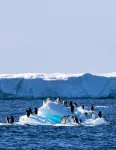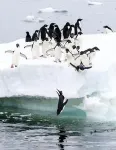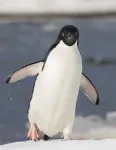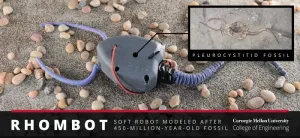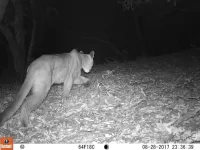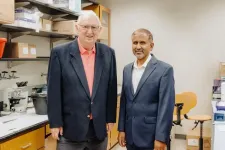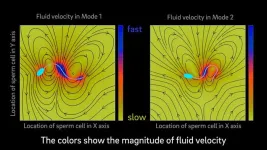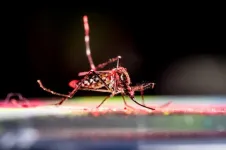(Press-News.org) EMBARGOED UNTIL: 6, NOVEMBER, 2023, 3 PM US EASTERN
A groundbreaking study published in the Proceedings of the National Academy of Sciences underscores the pivotal role that seasonal Antarctic sea ice plays in the annual molting periods of Adélie penguins. Despite the relatively large amount of sea ice still available in the Ross Sea, researchers have discovered a potential bottleneck in the penguins’ annual cycle, which could be exacerbated as the climate continues to change.
Unlike most penguin species, the majority of Adélie penguins are thought to carry out their annual molt (when they replace all their feathers to prepare for the long winter) on sea ice, away from breeding colonies, making this period challenging for researchers to study. This study, led by Dr. Annie Schmidt of Point Blue Conservation Science in Petaluma, California, utilized data from geolocating dive recorders deployed year-round on 195 adult penguins in the Ross Sea from 2017-2019. The resulting data enable the researchers to identify extended gaps in post-breeding diving activity, signaling the molting period.
Location data pinpointed two key molting areas. Satellite-based remote sensing data revealed that sea ice concentration during the molting period in the molting areas was notably low over the past five years, and has declined in the primary molting area since 1980.
Another significant finding was the positive correlation between annual return rates of penguins to breeding colonies and sea ice concentration in molting areas over the past 20 years; 2.4 to 4.8 percent fewer penguins returned with every 10% drop in sea ice concentration in the molting areas. This underscores the potential challenges penguins might face in the light of changing climate conditions.
"Our research sheds light on a facet of Adélie penguin's life that was previously underappreciated," stated Schmidt. "Understanding the intricate relationships between the environment, particularly sea ice, and all phases of the penguin's annual cycle is crucial, especially in the context of rapid climate change."
The research not only brings attention to the survival strategies of Adélie penguins but also emphasizes the broader implications of climate change on Antarctic ecosystems.
For further information, interviews, or to request a copy of the study, please contact:
Media Contact:
Zach Warnow
zwarnow@pointblue.org
415-786-5285
Note: the lead authors of the study are currently in the field in Antarctica with limited connectivity, but may be reached by satellite phone through the media contact listed above.
END
New study sheds light on Adélie penguins' reliance on declining sea ice during molt
Researchers have discovered a potential bottleneck in the penguins’ annual cycle, which could be exacerbated as the climate continues to change
2023-11-06
ELSE PRESS RELEASES FROM THIS DATE:
450-million-year-old organism finds new life in Softbotics
2023-11-06
PITTSBURGH—Researchers in the Department of Mechanical Engineering at Carnegie Mellon University, in collaboration with paleontologists from Spain and Poland, used fossil evidence to engineer a soft robotic replica of pleurocystitid, a marine organism that existed nearly 450 million years ago and is believed to be one of the first echinoderms capable of movement using a muscular stem.
Published today in The Proceedings of the National Academy of Science (PNAS), the research seeks to broaden modern perspective of animal design and movement by introducing a new a field of study - Paleobionics - aimed at using Softbotics, robotics ...
City and highway lights threaten mountain lion habitats
2023-11-06
City lights shine all night amid the bustling traffic, businesses and neighborhoods of Southern California, one of the most populated areas that mountain lions call home.
A study from the University of California, Davis, found that mountain lions avoid places with artificial light, even during the day. The finding adds to the list of challenges faced by the big cats in the region, where scientists have warned they may face extinction within decades.
The new study, published in the journal Philosophical ...
Prostate cancer drug candidate developed at University of Tennessee Health Science Center goes to first clinical trial
2023-11-06
A drug candidate developed by researchers at the University of Tennessee Health Science Center for advanced metastatic castration-resistant prostate cancer is now in its first clinical trial.
Ramesh Narayanan, PhD, deputy director of the Center for Cancer Research and the Muirhead Endowed Professor in the College of Medicine at UTHSC, and Duane Miller, PhD, Professor Emeritus in the Department of Pharmaceutical Sciences at UTHSC, have worked for more than a decade on therapies involving the hormone receptors that influence cancer progression. Their drug candidate, a molecule designed as a treatment for ...
Model suggests that mammalian sperm cells have two modes of swimming
2023-11-06
A new mathematical model predicts that mammalian sperm cells have two distinct swimming modes. This prediction opens new questions about potential connections between sperm cells’ motor activity and their transitions to hyperactivation phases that may play an important role in fertilization. The finding is part of a larger effort to use math and fluid dynamics to describe how mammalian sperm move. The research is led by a team of engineers at the University of California San Diego. The new work is published in the journal Physical ...
Ochsner Health hospitals and partners earn national recognition from The Leapfrog Group
2023-11-06
NEW ORLEANS, La. – Several Ochsner Health hospitals and partners across the Gulf South have earned an ‘A’ Leapfrog Hospital Safety Grade for Fall 2023.The Leapfrog Group, a national nonprofit watchdog that sets standards for excellence in patient care, assigns a grade to general hospitals across the country based on more than 30 national performance measures reflecting errors, accidents, injuries and infections, as well as the systems hospitals have in place to prevent them.
The following Ochsner Health hospitals and partners received an ...
Neuromorphic computing will be great… if hardware can handle the workload
2023-11-06
Technology is edging closer and closer to the super-speed world of computing with artificial intelligence. But is the world equipped with the proper hardware to be able to handle the workload of new AI technological breakthroughs?
“The brain-inspired codes of the AI revolution are largely being run on conventional silicon computer architectures which were not designed for it,” explains Erica Carlson, 150th Anniversary Professor of Physics and Astronomy at Purdue University.
A joint effort between Physicists from Purdue University, University of California San Diego (USCD) and École ...
Lightening the load: Beckman researchers develop autonomous electrochemistry robot
2023-11-06
Researchers at the Beckman Institute for Advanced Science and Technology developed an automated laboratory robot to run complex electrochemical experiments and analyze data.
With affordability and accessibility in mind, the researchers collaboratively created a benchtop robot that rapidly performs electrochemistry. Aptly named the Electrolab, this instrument greatly reduces the effort and time needed for electrochemical studies by automating many basic and repetitive laboratory tasks.
The Electrolab can be used to explore energy storage materials and chemical reactions that promote the use of alternative ...
Success of Wolbachia-infected mosquitoes in fighting dengue may be underestimated
2023-11-06
The fight against dengue fever has a new weapon: a mosquito infected with the bacteria Wolbachia, which prevents the spread of the virus. These mosquitoes have now been deployed in several trials demonstrating their potential in preventing disease transmission.
Now, researchers at the University of Notre Dame have conducted an analysis of the World Mosquito Program’s randomized control trial of Wolbachia-infected mosquitoes in Indonesia, looking at how excluding transmission dynamics impacted the original interpretation of the trial’s results.
“Randomized controlled trials are the gold standard for evaluating the efficacy of any ...
The uncharted role of HER2 mutant alleles in breast cancer
2023-11-06
“Our research study has demonstrated that poziotinib is highly potent in neratinib-resistant HER2 L755S lobular and ductal breast cancer models [...].”
BUFFALO, NY- November 6, 2023 – A new editorial paper was published in Oncotarget's Volume 14 on October 31, 2023, entitled, “The uncharted role of HER2 mutant alleles in breast cancer.”
Somatic HER2 mutations are a novel class of therapeutic targets across different cancer types. Treatment with the tyrosine kinase inhibitor (TKI) neratinib ...
From basic research to application: NRL geophysicist awarded NDIA Undersea Warfare Bronze Medal Achievement in Science
2023-11-06
WASHINGTON – Warren Wood, Ph.D., U.S. Naval Research Laboratory Ocean Sciences Division’s Geology and Geophysics section head, received the National Defense Industrial Association (NDIA) Bronze Medal on Sept. 19, 2023 during a ceremony held at the Naval Submarine Base in Groton, Conn. for outstanding individual achievement in undersea warfare.
This award-winning work would not have been possible without fantastic teamwork, especially from the staff in Geology and Geophysics and Acoustic Simulation, Measurements & Tactics Branches,” said Wood. “Essentially a software ...
LAST 30 PRESS RELEASES:
Scientists develop new gut health measure that tracks disease
Rice gene discovery could cut fertiliser use while protecting yields
Jumping ‘DNA parasites’ linked to early stages of tumour formation
Ultra-sensitive CAR T cells provide potential strategy to treat solid tumors
Early Neanderthal-Human interbreeding was strongly sex biased
North American bird declines are widespread and accelerating in agricultural hotspots
Researchers recommend strategies for improved genetic privacy legislation
How birds achieve sweet success
More sensitive cell therapy may be a HIT against solid cancers
Scientists map how aging reshapes cells across the entire mammalian body
Hotspots of accelerated bird decline linked to agricultural activity
How ancient attraction shaped the human genome
NJIT faculty named Senior Members of the National Academy of Inventors
App aids substance use recovery in vulnerable populations
College students nationwide received lifesaving education on sudden cardiac death
Oak Ridge National Laboratory launches the Next-Generation Data Centers Institute
Improved short-term sea level change predictions with better AI training
UAlbany researchers develop new laser technique to test mRNA-based therapeutics
New water-treatment system removes nitrogen, phosphorus from farm tile drainage
Major Canadian study finds strong link between cannabis, anxiety and depression
New discovery of younger Ediacaran biota
Lymphovenous bypass: Potential surgical treatment for Alzheimer's disease?
When safety starts with a text message
CSIC develops an antibody that protects immune system cells in vitro from a dangerous hospital-acquired bacterium
New study challenges assumptions behind Africa’s Green Revolution efforts and calls for farmer-centered development models
Immune cells link lactation to long-lasting health
Evolution: Ancient mosquitoes developed a taste for early hominins
Pickleball players’ reported use of protective eyewear
Changes in organ donation after circulatory death in the US
Fertility preservation in people with cancer
[Press-News.org] New study sheds light on Adélie penguins' reliance on declining sea ice during moltResearchers have discovered a potential bottleneck in the penguins’ annual cycle, which could be exacerbated as the climate continues to change
